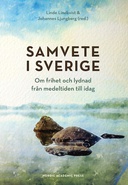Explore

Samvete i Sverige
Vi lever i en tid då tankar om samvete och samvetsfrihet syns allt oftare i svensk offentlighet i rikspolitiken, på tidningarnas ledarsidor och i sociala medier. Historiskt sett har de båda begreppen använts för att markera en viss mån av frihet eller en skyddad position i moraliska, politiska och rättsliga konflikter.
Hänvisningar till en enskild människas samvete och skillnader mellan en inre och en yttre domstol har kunnat legitimera befrielse från religiösa och statliga tvångsmekanismer och motiverat exempelvis vapen- eller abortvägran.
En grupp forskare i historia, mänskliga rättigheter, rätts-vetenskap, etik och religionssociologi tar här ett gemensamt grepp om några av de mest brännande konflikterna kring samvete och samvetsfrihet i Sverige från medeltiden till idag. Fram träder en bild av komplexa och motspänstiga begrepp som även idag bär påtagliga spår av äldre distinktioner och historiska konfliktsammanhang.
***
In recent years, ideas of conscience and the liberty of conscience have become ever more salient in public discourse. Historically, these concepts have been used to mark out a certain scope of freedom and protection in moral, political and legal conflicts. In our time, individual conscience is frequently used to legitimate objections to, for instance, military service and medical interventions like abortion and vaccination. So too in Sweden – a country widely described as one of the most modern and secularized societies in the world. In this volume, a group of researchers in history, human rights, law, ethics and sociology of religion address some of the most central issues around conscience and the liberty of conscience in Sweden from the middle ages to the present. By situating conscience and liberty in wider intellectual, social and political settings, the essays provide alternative ways of thinking about the most intractable problems surrounding these concepts – the relationship between law and morality, the tension between individual and collective freedom, as well as the role of religion in public affairs. This volume will create new avenues of research for scholars and students interested in challenges related to conscience and liberty: both those in ethics, politics and law seeking a historical perspective, and those in history who want to tie their studies to the present.
Academic co-ordinator is Professor Arne Bugge Amundsen, Department of Culture Studies and Oriental Languages, University of Oslo, Norway. ORCID: 0000-0001-5498-877X
This book is included in DOAB.
Why read this book? Have your say.
You must be logged in to comment.
Rights Information
Are you the author or publisher of this work? If so, you can claim it as yours by registering as an Unglue.it rights holder.Downloads
- 140 - pdf (CC BY-NC-ND) at Unglue.it.
Keywords
- Conscience
- Cultural Studies
- Ethics & moral philosophy
- Freedom of Conscience
- Germanic & Scandinavian languages
- History
- history of ideas
- History: specific events & topics
- Human rights
- Humanities
- Indo-European languages
- Language qualifiers
- Philosophy
- Political control & freedoms
- Politics & government
- Scandinavian History
- Scandinavian languages
- Social & cultural history
- Society & culture: general
- Society & Social Sciences
- thema EDItEUR::2 Language qualifiers::2A Indo-European languages::2AC Germanic and Scandinavian languages::2ACS Scandinavian languages
- thema EDItEUR::J Society and Social Sciences::JB Society and culture: general::JBC Cultural and media studies::JBCC Cultural studies::JBCC9 History of ideas
- thema EDItEUR::J Society and Social Sciences::JP Politics and government::JPV Political control and freedoms::JPVH Human rights, civil rights
- thema EDItEUR::N History and Archaeology::NH History::NHT History: specific events and topics::NHTB Social and cultural history
- thema EDItEUR::Q Philosophy and Religion::QD Philosophy::QDT Topics in philosophy::QDTQ Ethics and moral philosophy
Links
DOI: 10.21525/kriterium.32web: http://www.kriterium.se/site/books/e/10.21525/kriterium.32/
Editions



